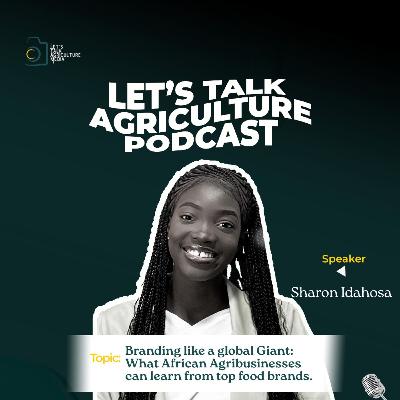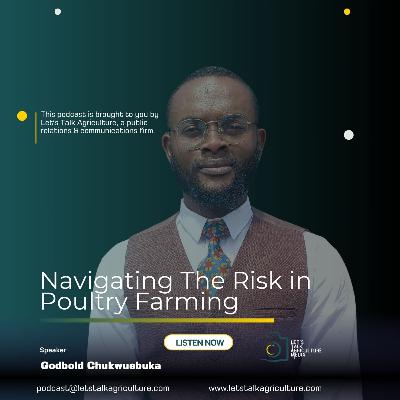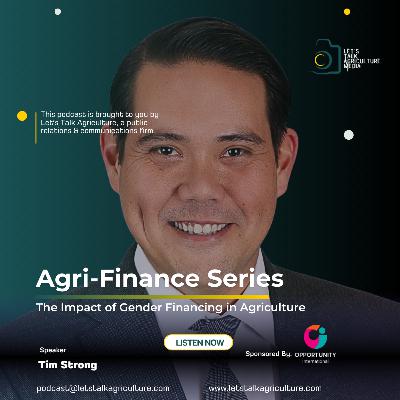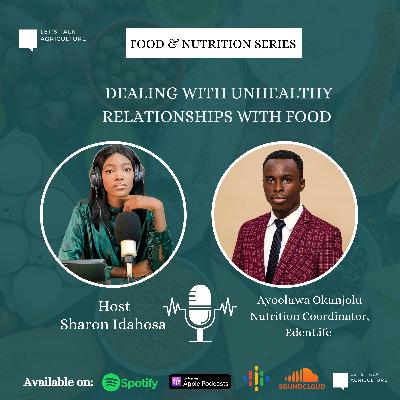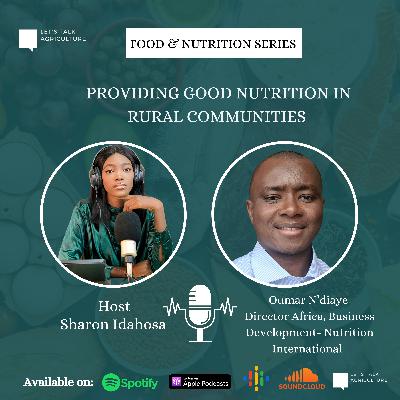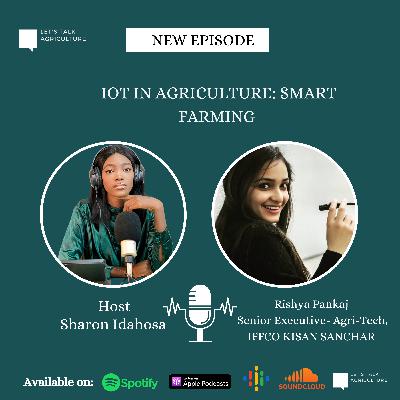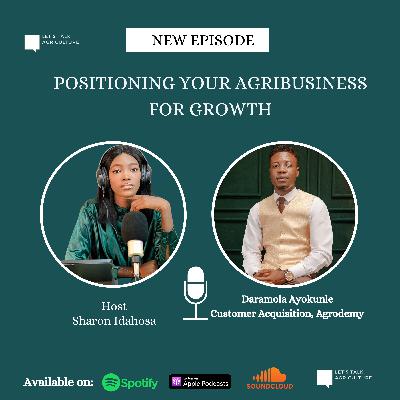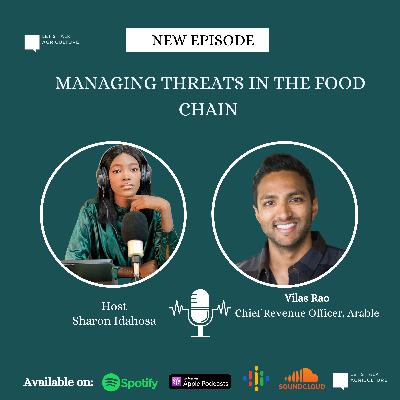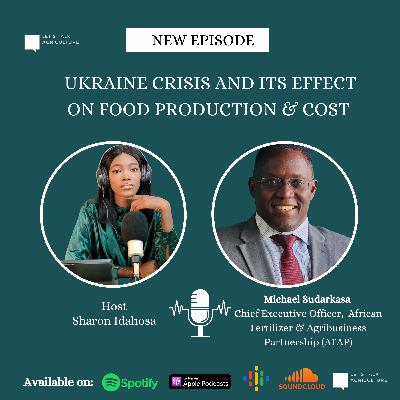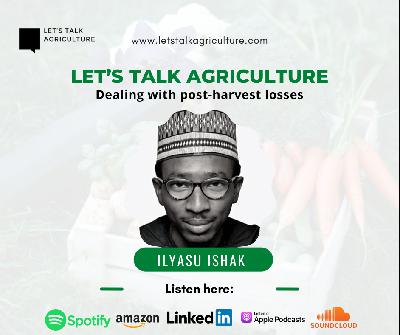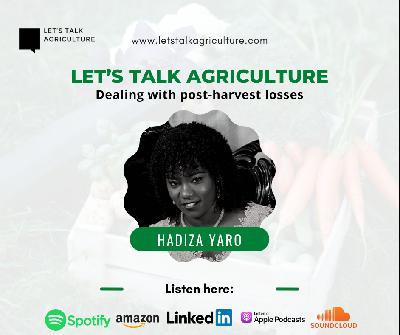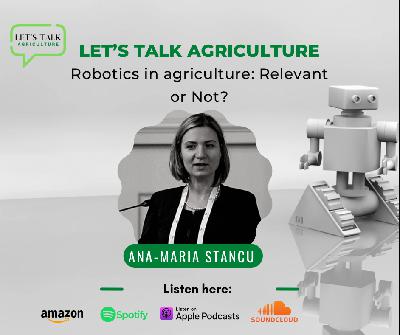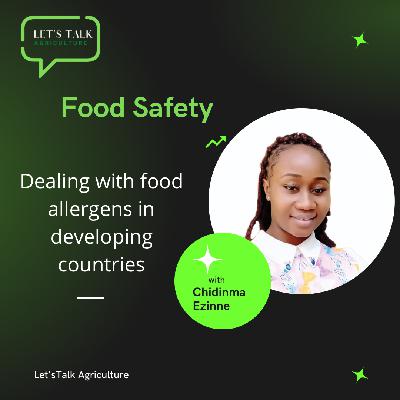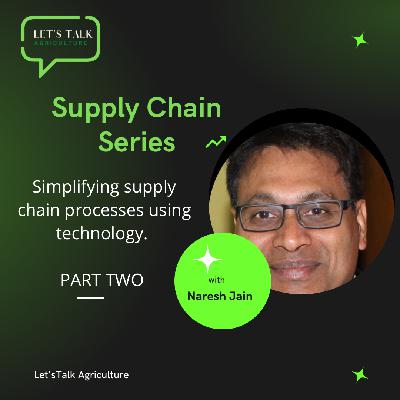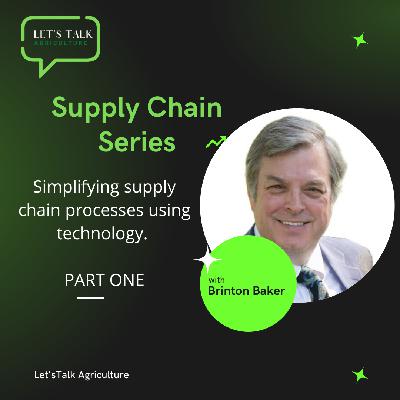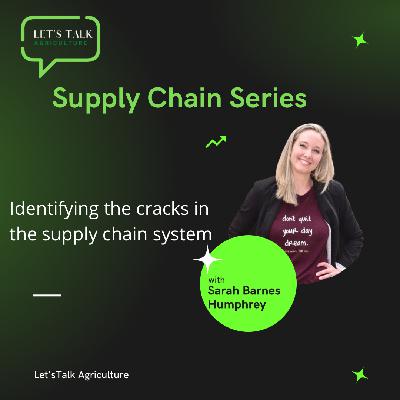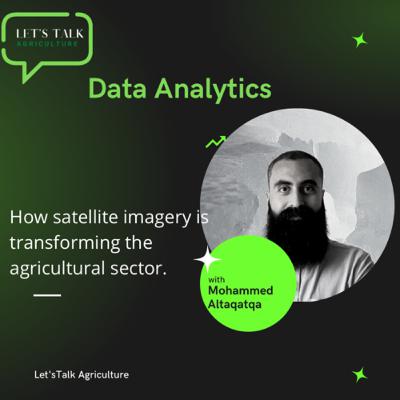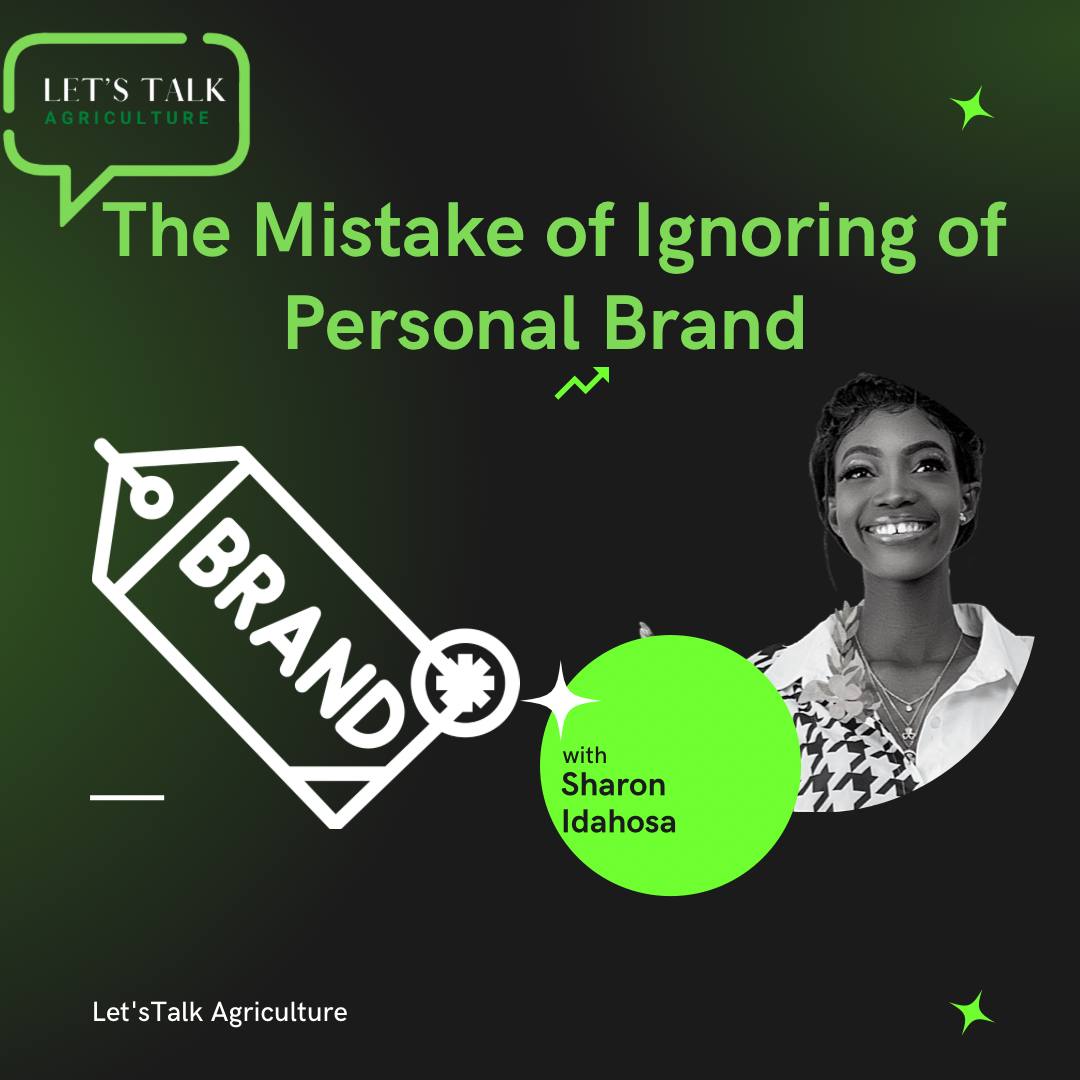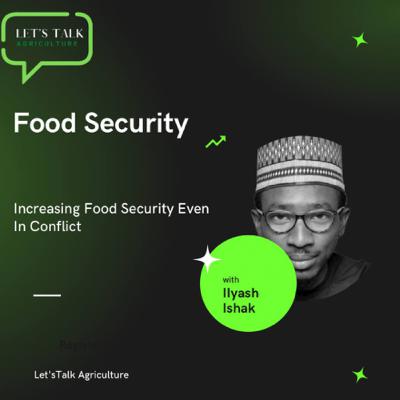Discover The Let's Talk Agriculture Podcast
The Let's Talk Agriculture Podcast

The Let's Talk Agriculture Podcast
Author: Sharon Idahosa
Subscribed: 13Played: 295Subscribe
Share
© Let's Talk Agriculture LLC
Description
The Let's Talk Agriculture Podcast is your go-to space for conversations shaping the future of food and agriculture across Africa and beyond. Powered by LTA Studio, we bring you real stories, bold ideas, and practical solutions from the people driving change in the agriculture ecosystem.
At LTA Studio, we specialize in podcast production, video creation, brand storytelling, and media solutions that help agribusinesses and organizations communicate with clarity and impact.
For collaborations, email studio@letstalkagriculture.com
At LTA Studio, we specialize in podcast production, video creation, brand storytelling, and media solutions that help agribusinesses and organizations communicate with clarity and impact.
For collaborations, email studio@letstalkagriculture.com
172 Episodes
Reverse
Welcome to another episode of the Let's Talk Agriculture Podcast! Today, we're diving into a critical topic—branding and marketing for agribusinesses. Many African agribusinesses do great work, yet they struggle to differentiate themselves in the market. Without strong branding, it becomes difficult to attract investors, customers, and partners. So, what can we learn from global food brands that have successfully built recognizable and trusted identities? Let's break it down. First, let's talk about Dangote Group. Dangote has established itself as a dominant player, not just in agriculture but across multiple industries. What's the secret? Consistency in branding. From product packaging to marketing campaigns, their identity remains the same, making them instantly recognizable. This is something many agribusinesses in Africa overlook—the power of consistency in messaging, design, and positioning. Next, we look at Nestlé and how they adapted their marketing to fit African cooking styles. Instead of using a one-size-fits-all approach, Nestlé tailored its branding and communication to resonate with local consumers. This is a key lesson—understanding your audience and localizing your messaging can set you apart. Then there's Olam Agri, which has positioned itself as a sustainability-driven agribusiness. In today's market, consumers and investors are paying more attention to sustainability. Olam Agri didn't just adopt sustainability as a practice, they made it part of their brand story, which helped them stand out and build trust. So, what's the key takeaway? African agribusinesses must be intentional about branding. Whether it's through consistency, audience-centered messaging, or sustainability, branding is what makes your business visible, credible, and competitive. At Let's Talk Agriculture Limited, we help agribusinesses develop strong branding, marketing, and communication strategies that position them for success. If you're struggling with differentiation, now is the time to start building a brand that lasts. Tune in to this episode to learn how you can apply these lessons to your agribusiness. Let's make African agribusinesses impossible to ignore!
[00:00:00] Intro [00:00:41] Sharon Idahosa: Hello, beautiful people. Welcome to the Let's Talk Agriculture podcast show, where we share the happenings, the trends and the opportunities in the agriculture sector. Now in today's episode, we will dive into poultry farming. A thriving business opportunity in Nigeria and, of course, across Africa. So while many [00:01:00] young people are super eager to jump into this lucrative field, it is crucial to understand some of the challenges that are involved, including the health issues, the And even mortality rates. [00:01:14] Sharon Idahosa: So joining me today is Goldbold Chukwuebuka, a young entrepreneur who is excelling in the poultry industry and still experiencing the downside associated with poultry farming. Now we will uncover the essential knowledge every aspiring poultry farmer should have in order to succeed and sustain their business. [00:01:36] Sharon Idahosa: Now, thank you so much for joining today, Chukwuebuka. I would really, really love to hear about your journey into the poetry, uh, into poetry farming. Please say hello to our guests, uh, audience rather. Thank you. [00:01:49] Godbold Chukwuebuka: So, hello. By the way, my name is Godbold Chukwuebuka, not Chukwuebuka. [00:01:53] Sharon Idahosa: Oh my, my apologies, my [00:01:56] Godbold Chukwuebuka: apologies. [00:01:57] Godbold Chukwuebuka: Godbold, Godbold, Godbold [00:02:00] Chukwemeka. [00:02:04] Sharon Idahosa: Ah, thank you. And to think that I was actually singing with the name before and, and now I missed it. My apologies for [00:02:13] Godbold Chukwuebuka: this. Thank you. [00:02:14] Sharon Idahosa: It's a pleasure to have you here. So please tell us your journey to go farming. [00:02:18] Godbold Chukwuebuka: So basically, it all started while I was in university. That was my 300 level, about entering second semester, 3 11 20 18. [00:02:27] Godbold Chukwuebuka: Entering about entering 400 level. So we had this program in our school then with Central Bank of Nigeria under CDC, Southeast Entrepreneurship Development Center. So they came to empower We the students, about entering year, they came to empower us based on agribusiness and management, because that was what I studied. [00:02:46] Godbold Chukwuebuka: The school. I studied agribusiness and management. So it was a three month program, was a three month program. The. It's going to go aspect of it is a second one to the practical aspect of it and th
Intro: [00:00:00] Sharon Idahosa: [00:43:00] Hello beautiful people. Welcome to the Let's Talk Agriculture podcast show, where we bring you the latest trends, opportunities, and innovations in the agriculture industry. Now this episode is brought to you by Opportunity International, a nonprofit organization equipping families with the tools [00:01:00] and training that they need to build their businesses, improve harvest, provide for their families and send their children to school, and even break the cycle of poverty. Now talk about innovative financial solutions. They can help families living in extreme poverty to build sustainable livelihood. Now, if you'd like to learn more and support the work that they do, quickly visit opportunity.org. Now, this is me bringing to you the impact that they have created so far when it comes to gender financing. We already know that women face so much challenges when it comes to getting access to finance. And if you're one of those, this is the best place, you know, to, you know, learn and get access to this initiative that they've put in place for you as a woman. And of course, if you are one of those supporting women, this is the best place to go. So, I encourage you to really just check out opportunity. org to see the best [00:02:00] ways that you can benefit. So, joining me today is Tim Strong, head of agricultural financing at Opportunity. Tim has successfully led the agri finance initiatives with his team in Malawi and beyond. Hello, Tim. Thank you so much for joining the show today. How are you doing? Timothy Strong: Thank you, Sharon. I'm really excited. As I said about it being Friday, I'm looking forward to the weekend ahead. It's absolutely a pleasure to be invited to join you on the podcast today. Sharon Idahosa: It's a pleasure to have you. I mean Fridays just look almost the same to me anyway. So, yeah, I looked through, um, the recent feature with you and your team on Bloomberg and I must say that you have done incredibly well. I mean a great job so far. So, I mean, why don't you share with us Um, the objectives of the gender finance projects and the implementation in Malawi. I know it was Implemented in Malawi or is it beyond Africa already? But I mean, let's just have this as a case study. Timothy Strong: Very cool Sharon So, um, it's definitely been a [00:03:00] pleasure to be able to spread the good news I think you and I have some very similar perspectives in terms of the gospel of the small holder farmer Uh, for us at Opportunity, it's really been a journey for us as we've continued to really focus what we do on listening to our clients. Um, so a lot of what, uh, you referenced to in terms of the Bloomberg article and how we're innovating with generative artificial intelligence to support farmers, it all boils down to that same piece is how do we make sure that we implement human centered design. How do we become specialists and listening to the needs of the variety of clients that we have for opportunity has been, uh, as I said, a journey and we've been in operations now for over 53 years Organizationally We've been able to reach over 19. 4 million clients and 95 percent of those whom are women. And we've partnered with 130 different financial institutions across 33 countries within our overall lending book of roughly 2. 3 billion. Um, over 450 million of [00:04:00] that, uh, is financing directly the unlock. Um, so for us, we really see our mission and our mandate to really make sure that we're bringing together the right partners and the right relationships to access, uh, to really have a centered focused on X. It's really, you know, capital as an access piece for farmers, training and support networks. Um, really a lot of this, uh, builds up on that, but, um, for our team and our program. We've come together for agricultural finance around a belief in rural prosperity. How do we really see that farmers are the major driving engine of economic growth in all of the countries that we live in? And how do we make sure that they're served as such? So, when I, when I mention rural prosperity in shorts, our mandate as a program is helping farmers to grow more. And to earn more. Um, and really that becomes one of the most. So, we see that investing in agriculture is one of the most powerful actions we can take for more inclusive future, more opportunities and agriculture mean that fewer people go hungry, fewer children miss [00:05:00] school, and rural families are able to build. So, you know, that's a really ambitious goal for us as a program and as a whole. And yet, we've really developed our work and our portfolios because of one key fact. And it's really that many farmers here and across sub Saharan Africa still only do at 20 to 30 percent of them. So, for us, really making sure that we're supporting farmers again, on that same mandate of supporting farmers to grow more and to earn more is key. Um, but you know, for us, When we look at some of the numbers and the figures and listen to our, listen to our clients, we also see that on average, about 55 to 60 percent of all labor on all farms across Africa is conducted by women. So, if we're not really developing strategies, tactics, and mechanisms to make sure women are included in this economic growth. Then we've lost the plot, um, we've really missed the target as a whole. Um, so Sharon, I am really grateful for the time today to really share in terms of opportunities, [00:06:00] agriculture, finance, work, and our women's economic advancement strategy. Uh, my team has given me a liberty to name the strategies. So, we're calling it our GROW strategy, which is Guaranteeing Rural Opportunities for Women. It's really exciting for me to be able to share, uh, the Uh, what we're launching now after we've conducted a number of highly rigorous equity audits across our programming and our staffing, how do we really define support and targets for partners and outcomes for women? Really defining our activities and targets across all of our programmatic pillars, uh, and committing to, to partnerships with specialists. Uh, especially for areas that are outside of our, our own professional remits. So, you know, specifically looking at violence against women, how do we make sure we build partnerships? Um, so that's just kind of a briefer in terms of what we're looking at, but ultimately have a very robust, in my opinion, strategy for how do we move forward and really look at why this is important to us as an organization as a whole. So, Sharon, that's kind of the brief overview. [00:07:00] Um, I can of course talk for hours and hours and hours as I think, Sharon, you can acknowledge, um, around what we're striving to do, but we're really excited about next steps. Sharon Idahosa: Yeah, I know definitely women contribute greatly to the agricultural sector, but they still definitely face some sort of, um, barrier when it comes to accessing finance. And it's really amazing to know that, um, your team is doing something to get them involved. I mean, they contribute, I think, about 60 to 70 percent of the food that we eat, they are majorly, um, women involved in farming. But yet, we still see them getting, um, um, struggle when it comes to accessing finance. And most of the financial institutions, um, Um, I believe that they should, um, tailor some of their policies or tailor the products to the farmers directly. And I think I heard you saying something about, um, speaking to the farmers to know what they need for you to, you know, um, set up. a [00:08:00] policy or a product that fits them. Because sometimes I don't know about your location, but I know that, um, I've heard so many farmers complain about, um, having to, um, bring their husbands, you know, get access to finance that they need to, you know, scale business. I think is, um, sorry to say, but if you ask me, I think it's ridiculous. I mean, because sometimes. And in some locations, rather here in Nigeria, uh, many of the farmers are women, right? And, um, their husbands are not involved. And when they go to the farms, most of the husbands end up collecting the, the funds that was given to them because they had to bring their husbands, you know, head of the home to get access to that finance. But I think that if there is a particular, um, product that is targeted to women and they do not need to Um, um, fill out all of those criteria or have to bring their, their, their husbands, you know, get access to finance, they will [00:09:00] be able to have access or better control of the funds that they've been given, and they will be able to scale their businesses without, um, in form of, um, challenge. So I would like to know, maybe there's some sort of, um, innovative approaches or technologies or something that have been leveraged by your organizations, you know, support women in accessing this finance without experiencing all of this barriers or something. Timothy Strong: Yeah, sure. And I, um, would love to, to dig into this deeper. And this is a topic that's very near and dear to my heart as well. Um, especially as my wife is also a woman in agriculture, as we have a small cattle farm in the Southern part of Malawi. So, um, definitely see firsthand a lot of the limitation. Um, first off, I think there are two really important points from the last five years of our overall gender strategy within our agriculture finance and a running, uh, from 2018 until now, as we're looking to revamp our approaches, um, the first and foremost is that [00:10:00] women and gender, it's not a monolith, right? So really understanding that one woman's need is not the same as the next. So, making sure, uh, as you, as you called out from the previous comment that we're listening and understanding to the varying needs of different women in agriculture. I can guarantee you that a woman who's running a multinational dairy business Central Nigeria. Her needs and, and her educational background
Still on the food and nutrition series... In this episode of the Let's Talk Agriculture podcast show, Sharon Idahosa discusses with Ayooluwa Okunjolu of EdenLife the different ways we can deal with Unhealthy relationships with food. As much as we agree that food is life, and food is health, there are a lot of people who have an unhealthy relationship with food and this episode will serve as a guide to building a good food relationship. In this episode; You'll learn about unhealthy food relationships, and how to know if one is dealing with this. You'll learn key strategies for maintaining healthy food relationships. Don't be left out! Share this episode with your friends, network & family. You can follow us on all our social media channels. Linkedin Facebook Instagram Twitter YouTube
We started a series this month with the theme of food and nutrition which is a major concern for all. Food and nutrition are the way that we get fuel providing energy for our bodies. In this week's episode, we discussed how we can provide good nutrition in rural communities as many low-income countries rely more on staple foods and less on fruits, vegetables, and animal-source foods than high-income countries. We were privileged to have Oumar N'diaye Director of Africa, Business Development of Nutrition International to share his knowledge and of course the best ways we can have good and nutritious food. Some of the questions tackled in this episode; 1. What role agriculture plays to increase the availability and access to nutritious food in rural areas? 2. How to utilize nutrition education to improve household nutrition. 3. A lot of people know the kind of food to eat but still avoid eating them. What could be the cause? Listen to our host, Sharon Idahosa as she discusses with Oumar N'diaye in the food and nutrition series. To stay up-to-date, you can follow us on our social media platforms. LinkedIn Twitter Facebook Instagram YouTube
Today on the Let's Talk Agriculture podcast show, we bring another educating episode to you. In our previous episodes, we've discussed robotics in agriculture, and satellite imagery, and now we are looking into IoT- Smart Farming. We had the opportunity to discuss with a senior executive in Agri-Tech from Kisan Sanchar, Rishya Pankaj who shared
In this episode of the Let's Talk Agriculture podcast show, we had a chat with Daramola Ayokunle a youth in agriculture. He revealed to us the sales and marketing strategies that you can apply to position your agribusiness for rapid growth. If you haven't been investing in your marketing or you do not know how to draw up a strategy for your agriculture business, then you should listen to this podcast. For sponsorship, advertising & collaboration, please send an email to hello@letstalkagriculture.com We remain your preferred agriculture public relations & communications company. Follow us on Linkedin Instagram Facebook
The agricultural sector contributes greatly to Nigeria's GDP with major commodities like sesame seeds, cocoa beans, cashew nuts ginger, palm kernel oil, frozen shrimps, and prawns but still experiences some constraints when it comes to the exportation of agro-commodities. In this episode of the Let's Talk Agriculture podcast show, we discussed the business of exportation to give us a better understanding of the exportation business. We were privileged to have AFEX's VP of Commercials, Debajyoti Bhattacharyya on the show where he shared deep facts as regards the Nigerian agriculture sector, and better ways we can maximize our opportunities in the areas of export of agro-commodities. Take a deep dive into the resources he shared with us. Stay connected with us: LinkedIn Facebook Instagram YouTube
The risk to the human food chain has increased drastically, partly due to the movement of people, plants, and animals between countries and this can cause a detrimental effect on our food security and that's a major concern for all of since considering we are still working towards achieving food security on all levels. In this week's episode, we had the opportunity to seat with Arable's Chief Revenue Officer who shared his thoughts with us and the ways we can manage the threats in the food chain. Vilas Rao discussed; What the food chain is all about in the simplest way possible. He discussed the major threats in the food chain. And the roles we play in averting the threats in the food chain. He was kind enough to share some resource materials to help us learn and understand this topic greatly. Please check this out....https://www.arable.com/blog/ ............................................................................................................................. To learn more about what we do, explore our website herehttps://letstalkagriculture.com Follow us on Linkedin Instagram:https://www.instagram.com/wetalkagriculture/ Facebook: https://web.facebook.com/wetalkagriculture
The war in Ukraine, as well as sanctions against Russia, has resulted in a massive decline in the supply of major staple foods which is contributing to the rise of food prices globally. This episode of the Let's Talk Agriculture podcast show was a request by one of our listeners who is feeling the heat the war between the Russia-Ukraine crisis is causing in Nigeria. As of 2022 agriculture was employing about 70% of the labor workforce of the Nigerian population and in 2022 has contributed about 22.36% to the GDP. This alone shows that agriculture remains the foundation of the Nigerian economy and many others. To discuss this topic on a global scale, had a seat with the Chief Executive Officer of the African Fertilizer and Agribusiness Partnership (AFAP) to share and guide us on the way forward Tune in to listen to Sharon Idahosa, the host, and Michael Sudarkasa, our guest for today's show. Stay updated with our activities by following us on social media Facebook: https://web.facebook.com/wetalkagriculture Linkedin: https://www.linkedin.com/company/lets-talkagriculture/ Instagram: https://www.instagram.com/wetalkagriculture/ YouTube: https://www.youtube.com/channel/UCjTYhvTHoX4WEaHBdoeARng
This episode features Ilyasu Ishak, an agribusiness development consultant sharing his knowledge on how we can deal with post-harvest losses in the fruits and vegetable value chain. Episodes are available on Spotify, Apple podcasts, Google podcasts, SoundCloud, Amazon music, Boom and more. To learn more about our sponsor for the month, visit www.agromarketsquare.com Follow us on: LinkedIn: Instagram: @wetalkagriculture Facebook: https://www.facebook.com/wetalkagriculture/
In this week's episode, we took a different route to discuss Robotics. As new technologies emerge, we believe that it solves major problems & benefit stakeholders in the agriculture space. To make this happen, we brought on the show an expert in Robotics and a key player in the agricultural sector. Ana-Maria shares her insights on the major pain point of farmers that robotics has come to solve. She also highlighted that robotics has not come to take away the jobs of people. Learn more about our sponsor by visiting Agro Market Square Follow us on LinkedIn
This episode features Chidinma Ezinne, a food scientist and quality assurance professional. We invited Chidinma on the show to guide us gradually into Food Allergens as this is a major topic of discussion when it comes to Food Safety. We were able to understand that food allergies can occur when the immune system mistakenly treats protein food as a threat. Some of the common food identified to cause food allergies were milk, eggs, sesame, fish, etc. Listen to this episode to learn more about how we can deal with food allergens in developing countries. Learn more about our sponsor for this episode by visiting https://agromarketsquare.com Follow us on LinkedIn
Still, on the supply chain podcast series, we got the opportunity to bring on the show a start-up founder to give us the PART TWO of how we can simplify supply chain processes using blockchain technology. In this episode with the co-founder of Snapper Future Tech, Naresh Jain You'll learn the importance of technology in simplifying supply chain processes. You'll learn from his experience in the technology industry, the challenges he faced, and more. This is very important for those that are in tech, the challenges you're going through, don't change anything about you.
Yes!! We made it to release another episode of the supply chain podcast series. In our previous episode, we were able to identify the cracks in the supply chain system, and now we have taken a step forward to understanding how we can simplify the supply chain processes using technology. The use of technology has played a key role in advancing the agricultural sector. To understand how technology can help simplify the supply chain processes, we were able to get in touch with Brinton Baker, the VP of Global Marketing at dFarm. dFarm integrates your entire ag supply chain heuristically from farmer to retailer to deliver unprecedented transparency and efficiency. Their distributed (blockchain) ERP reduces waste while making possible precision tracking and tracing and a dynamic trading platform. Follow dFarm on LinkedIn. Stay in touch with Let's Talk Agriculture on LinkedIn Follow our podcast host, Sharon Idahosa on LinkedIn
Hey, beautiful people! Welcome to our series on supply chain. In this first episode of the supply chain, we are identifying the cracks in the supply chain system and how we can move past them. We had the opportunity to bring on the show, the award-winning and most influential leader in supply chain, and podcast host of Let's Talk Supply Chain - Sarah Barnes Humphrey who shared from her experience the challenges in the supply chain system, the future of the supply chain industry
Guys! This episode takes a deep dive into technology and how it's benefitting the agricultural sector. One of the technologies breaking grounds in this sector is the satellite imagery/remote sensing which helps players in the agricultural sector to detect pests, prevent diseases and keep crops healthy. In this episode, we had the opportunity to bring in a partner & sales manager at EOS DATA ANALYTICS, Mohammed Altaqatqa to share more insight on how they are helping transform the agricultural sector in over 30 countries. Follow our page on LinkedIn https://www.linkedin.com/company/lets-talkagriculture/
This podcast episode was made with love from my heart to let agribusiness owners know that they need to invest in branding, and marketing to ensure the growth of their businesses. In this podcast episode, I gave the difference between branding, brand identity, & brand marketing.
The bandit threats in Nigeria continue and at a very high rate which is causing the deaths, and kidnappings of many citizens of Nigeria. Considering the happenings in the Northern part of Nigeria, many food-producing states are facing the heat. Kaduna State is a major producer of Maize and is currently being invaded by bandits, and if drastic measures aren't followed, Nigeria may see food scarcity, price inflation, and Food Insecurity at large. --- Send in a voice message: https://anchor.fm/sharoni2/message


